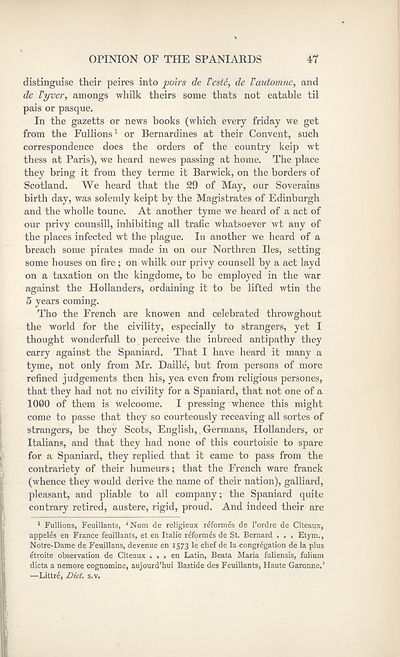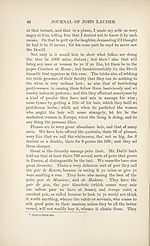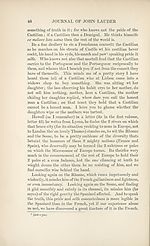Series 1 > Journals of Sir John Lauder, Lord Fountainhall, with his observations on public affairs and other memoranda, 1665-1676
(118) Page 47
Download files
Complete book:
Individual page:
Thumbnail gallery: Grid view | List view

OPINION OF THE SPANIARDS
47
distinguise their peires into 'pairs dc VesU, de Vautomne, and
de Vyver, amongs whilk theirs some thats not eatable til
pais or pasque.
In the gazetts or news books (which every friday we get
from the Fullions1 or Bernardines at their Convent, such
correspondence does the orders of the country keip wt
thess at Paris), we heard newes passing at home. The place
they bring it from they terme it Barwick, on the borders of
Scotland. We heard that the 29 of May, our Soverains
birth day, was solemly keipt by the Magistrates of Edinburgh
and the wholle toune. At another tyme we heard of a act of
our privy counsill, inhibiting all trafic whatsoever wt any of
the places infected wt the plague. In another we heard of a
breach some pirates made in on our Northren lies, setting
some houses on fire ; on whilk our privy counsell by a act layd
on a taxation on the kingdome, to be employed in the war
against the Hollanders, ordaining it to be lifted wtin the
5 years coming.
Tho the French are knowen and celebrated throwghout
the world for the civility, especially to strangers, yet I
thought wonderfull to perceive the inbreed antipathy they
carry against the Spaniard. That I have heard it many a
tyme, not only from Mr. Daille, but from persons of more
refined judgements then his, yea even from religious persones,
that they had not no civility for a Spaniard, that not one of a
1000 of them is welcoome. I pressing whence this might
come to passe that they so courteously receaving all sortes of
strangers, be they Scots, English, Germans, Hollanders, or
Italians, and that they had none of this courtoisie to spare
for a Spaniard, they replied that it came to pass from the
contrariety of their humeurs; that the French ware franck
(whence they would derive the name of their nation), galliard,
pleasant, and pliable to all company; the Spaniard quite
contrary retired, austere, rigid, proud. And indeed their are
1 Fullions, Feuillants, ‘Nom de religieux reformes de I’ordre de Citeaux,
appeles en France feuillants, et en Italic reformes de St. Bernard . . . Etym.,
Notre-Dame de Feuillans, devenue en 1573 le chef de la congregation de la plus
etroite observation de CSteaux . . . en Latin, Beata Maria fuliensis, fulium
dicta a nemore cognomine, aujourd’hui Bastide des Feuillants, Haute Garonne.’
—Littre, Diet. s.v.
47
distinguise their peires into 'pairs dc VesU, de Vautomne, and
de Vyver, amongs whilk theirs some thats not eatable til
pais or pasque.
In the gazetts or news books (which every friday we get
from the Fullions1 or Bernardines at their Convent, such
correspondence does the orders of the country keip wt
thess at Paris), we heard newes passing at home. The place
they bring it from they terme it Barwick, on the borders of
Scotland. We heard that the 29 of May, our Soverains
birth day, was solemly keipt by the Magistrates of Edinburgh
and the wholle toune. At another tyme we heard of a act of
our privy counsill, inhibiting all trafic whatsoever wt any of
the places infected wt the plague. In another we heard of a
breach some pirates made in on our Northren lies, setting
some houses on fire ; on whilk our privy counsell by a act layd
on a taxation on the kingdome, to be employed in the war
against the Hollanders, ordaining it to be lifted wtin the
5 years coming.
Tho the French are knowen and celebrated throwghout
the world for the civility, especially to strangers, yet I
thought wonderfull to perceive the inbreed antipathy they
carry against the Spaniard. That I have heard it many a
tyme, not only from Mr. Daille, but from persons of more
refined judgements then his, yea even from religious persones,
that they had not no civility for a Spaniard, that not one of a
1000 of them is welcoome. I pressing whence this might
come to passe that they so courteously receaving all sortes of
strangers, be they Scots, English, Germans, Hollanders, or
Italians, and that they had none of this courtoisie to spare
for a Spaniard, they replied that it came to pass from the
contrariety of their humeurs; that the French ware franck
(whence they would derive the name of their nation), galliard,
pleasant, and pliable to all company; the Spaniard quite
contrary retired, austere, rigid, proud. And indeed their are
1 Fullions, Feuillants, ‘Nom de religieux reformes de I’ordre de Citeaux,
appeles en France feuillants, et en Italic reformes de St. Bernard . . . Etym.,
Notre-Dame de Feuillans, devenue en 1573 le chef de la congregation de la plus
etroite observation de CSteaux . . . en Latin, Beata Maria fuliensis, fulium
dicta a nemore cognomine, aujourd’hui Bastide des Feuillants, Haute Garonne.’
—Littre, Diet. s.v.
Set display mode to:
![]() Universal Viewer |
Universal Viewer | ![]() Mirador |
Large image | Transcription
Mirador |
Large image | Transcription
Images and transcriptions on this page, including medium image downloads, may be used under the Creative Commons Attribution 4.0 International Licence unless otherwise stated. ![]()
| Scottish History Society volumes > Series 1 > Journals of Sir John Lauder, Lord Fountainhall, with his observations on public affairs and other memoranda, 1665-1676 > (118) Page 47 |
|---|
| Permanent URL | https://digital.nls.uk/126981153 |
|---|
| Attribution and copyright: |
|
|---|
| Description | Over 180 volumes, published by the Scottish History Society, containing original sources on Scotland's history and people. With a wide range of subjects, the books collectively cover all periods from the 12th to 20th centuries, and reflect changing trends in Scottish history. Sources are accompanied by scholarly interpretation, references and bibliographies. Volumes are usually published annually, and more digitised volumes will be added as they become available. |
|---|


